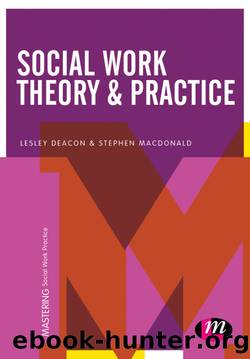Social Work Theory and Practice by Lesley Deacon Stephen J. Macdonald

Author:Lesley Deacon, Stephen J. Macdonald [Lesley Deacon, Stephen J. Macdonald]
Language: eng
Format: epub
ISBN: 9781473958692
Barnesnoble:
Goodreads: 33368888
Publisher: Learning Matters
Published: 2017-04-15T00:00:00+00:00
1. Individualism
2. Purposeful expression of feelings
3. Controlled emotional involvement
4. Acceptance
5. Non-judgemental attitude
6. Rights to self-determination
7. Confidentiality
While these principles are underpinned by a Christian ethos (Whiting, 2010) and are almost 60 years old at the time of writing this chapter, it is possible to see how these can still be beneficial to social work practice today.
Individualism
Biestek (1957) emphasises that each person encountered in the course of social work practice must first and foremost be recognised as an individual and therefore as unique. So, while previous ways of working may have worked in context before, social workers should enter every new working relationship seeking to recognise the uniqueness of the individual, therefore understanding that they need to adapt the way they work to suit this particular service user or carer.
Purposeful expression of feelings
What Biestek (1957) was referring to here was that service users and carers must be allowed to express their feelings freely without condemnation. For example, if a parent becomes angry when accused of some form of abuse or neglect towards their child, they must be free to respond honestly, i.e. with anger, and should not be condemned for this, say for example being reported as a parent having problems with anger management.
Controlled emotional involvement
While not suggesting friendships should be made, Biestek (1957) did advocate that social workers need to be sensitive to the feelings of service users and to respond appropriately. So, going back to the previous example, an initial response to parental anger in such a stressful and difficult situation should first and foremost be understanding and recognition.
Acceptance
As well as recognising the uniqueness of individuals, Biestek (1957) identifies the importance of accepting the service users or carers for who they are rather than for the person the practitioner wants them to be. This means accepting both their strengths and weakness and respecting them for the person they are.
Non-judgemental attitude
When considering any issues of safeguarding in particular this is a key principle that Biestek (1957) advocates â not to ascribe either guilt or innocence to the service user or carer. In fact, the social worker should enter the situation in a completely open manner and not ascribe problems to the person themselves but to the behaviour or to the situation. So, for example, if there is evidence of abuse or neglect then the social worker should see this as the behaviour of a person and not an attribute of the person themselves.
Rights to self-determination
This emphasises the importance of allowing people to make their own choices about their lives. The very nature of the relationship between a social worker and a service user or carer can be seen as interfering as social workers are involved in the very essence of peopleâs private lives â in their homes. However, it is important that the people they encounter are respected and given the freedom to choose. Biestek (1957) recognises the significance of the restrictions that law, policy and capacity place on this, although by respecting the personâs rights first, a social worker can perhaps better explain when and why those freedoms may be curtailed.
Download
This site does not store any files on its server. We only index and link to content provided by other sites. Please contact the content providers to delete copyright contents if any and email us, we'll remove relevant links or contents immediately.
Cecilia; Or, Memoirs of an Heiress — Volume 1 by Fanny Burney(32548)
Cecilia; Or, Memoirs of an Heiress — Volume 2 by Fanny Burney(31947)
Cecilia; Or, Memoirs of an Heiress — Volume 3 by Fanny Burney(31932)
The Great Music City by Andrea Baker(31917)
We're Going to Need More Wine by Gabrielle Union(19035)
All the Missing Girls by Megan Miranda(15962)
Pimp by Iceberg Slim(14489)
Bombshells: Glamour Girls of a Lifetime by Sullivan Steve(14058)
For the Love of Europe by Rick Steves(13933)
Talking to Strangers by Malcolm Gladwell(13350)
Norse Mythology by Gaiman Neil(13349)
Fifty Shades Freed by E L James(13233)
Mindhunter: Inside the FBI's Elite Serial Crime Unit by John E. Douglas & Mark Olshaker(9324)
Crazy Rich Asians by Kevin Kwan(9280)
The Lost Art of Listening by Michael P. Nichols(7494)
Enlightenment Now: The Case for Reason, Science, Humanism, and Progress by Steven Pinker(7306)
The Four Agreements by Don Miguel Ruiz(6745)
Bad Blood by John Carreyrou(6611)
Weapons of Math Destruction by Cathy O'Neil(6267)
